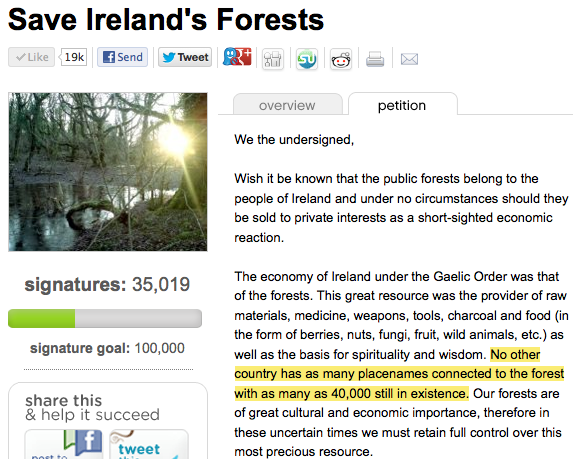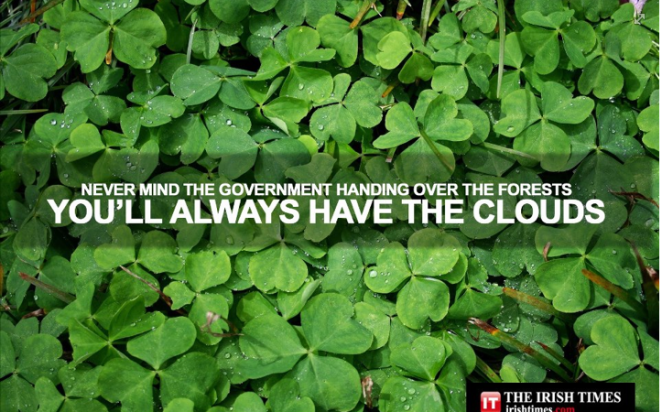Update: for St Patrick’s Day please sign the online petition against the sale of Ireland’s public forest harvesting rights – you can sign here
This is a brand new image for St Patrick’s day 2013 – created by Eamonn Crudden, an old art college classmate. This is just one image from his facebook album that he posted yesterday, which could be titled ‘today’s great reasons to love Ireland’ (see more works that reflect the Ireland of 2013 here).
If you are not in Ireland, you may be not aware that the Irish Government is proposing the sale of the harvesting rights of its public forests for the next 80 years. In Europe, no other country has privatised its public forests, as noted in last weeks Al Jazeer report a couple of days ago. (You can help raise awareness of this issue by signing the online petition (see end of this article) – people from all over the world are signing it for St. Patrick’s Day)
This issue is a concern to me as I’ve been involved in recent weeks helping the Green Party with statements on its position against the sale of the forest harvesting rights (I helped develop the Irish Green Party‘s All Ireland Forest policy (2012) over the last three years). The key recommendation of Green Party Forest policy stresses the need to further develop the significant potential of recent afforestation established over the last 40 years (Ireland was deforested centuries ago), that we need to gradually move to permanent, non clearfell continuous cover forests to maintain and further develop our forests for important ecological, cultural and economic reasons. The sale of the harvest rights of Irish forests for the next 80 years directly opposes this. It would dramatically undermine decades of development, fragment and endorse clearfelling for short term gains and completely limit future control, and possibly access to of much of Ireland’s public forests.
For example, the sale of the forest harvesting rights would deny the great opportunities that continuous cover, close-to-nature forestry would afford. This is a new type of forest management, based on best European practice – employing long term thinking and practices to maintain forests permanently not just for economic returns but for critical ecological and important cultural and amenity reasons.
Generally, forests are not high on the political agenda in Ireland as it is only beginning to re-establish forests since the 1950s – as it stands only about 11% of our land is now covered in forests, much lower than the European average and a large proportion are coniferous plantations, not forests in a true sense. Saying that, a staggering 18 million visits are made to our forests every year – and the memories are strong too in the 40,000 Irish place names (and Ogham alphabet inscribed on our ancient stones) that remind one how this once was a very forested, vibrant and biodiverse land (several hundred years ago, Ireland was even referred to as ‘Wolfland’ because of the large numbers of wolves supported by its forests). As Ireland has some of the best tree growing conditions in Europe there is huge potential to develop forests here for their immense and intrinsic ecological values, their cultural values and to assist further the development of a thriving forest industry.
Debates in the media and online on the sale of Ireland’s public forest harvesting rights have been growing in recent months though and already 35 019+ people have already signed an online petition against the sale of the public forest harvesting rights – you can sign here if you haven’t already. The recent backtrack of the UK government of the sale of UK’s public forests in the last couple of years must surely be giving the Irish Government pause for thought too – in recent times, no other issue brought so many people out in the UK to protest right across the land.
 And this month, when the Irish Government decision about Ireland’s forest future is imminent, the UN has just announced that March 21, 2013 will be the first International Day to recognise Forests worldwide. I’d say the Irish government may have to explain on many different grounds its decision if it does decide to proceed to sell Ireland’s public forests harvesting rights.
And this month, when the Irish Government decision about Ireland’s forest future is imminent, the UN has just announced that March 21, 2013 will be the first International Day to recognise Forests worldwide. I’d say the Irish government may have to explain on many different grounds its decision if it does decide to proceed to sell Ireland’s public forests harvesting rights.
‘The United Nations General Assembly has proclaimed 21 March the International Day of Forests. From 2013, the day will be observed each year to celebrate and raise awareness of the importance of forests and trees to all life on earth. ‘ FAO 2013
While there has been some celebration last week that,’over 11,000 hectares in the Nephin Beg Range of North West Mayo have been designated as Ireland’s first wilderness area following the signing of a Memorandum of Understanding between Coillte (Ireland’s largest commercial state sponsored forest company) and the Department of Arts, Heritage and the Gaeltacht’, the significant countrywide potential in creating permanent forests in Ireland, for far greater ecological (and economic benefits) is as yet, still far from being generally recognised.
PS don’t forget to sign the petition now and do feel free to share this article


Really important to get the Irish electorate onboard with signing this petition as the govt will largely ignore folk from outside.
LikeLike
Thanks Rhys,
Yes, hundreds more people here have signed in the last couple of days, thanks for dropping by
LikeLike
Robert Graves, in 1948, during a time recovering from world devastation wrote a book entitled “The White Goddess” In it he put forward the theory that our original Ogham language was inspired by a tree alphabet made up from the names of sacred trees known as “Beth Luis Nion”, the Birch Rowan and the Ash…. the first three letters of that language system.
He believed that our ancient ancestors saw these trees as directly connected to the divine forces that formed the fabric of nature herself. The words formed from it were written upon a landscape that was seen as much more significant than its use as a building material or export commodity. The living presence of these trees provided food, shelter and healing to inhabitants that knew and understood their true potential. Through them are harbored the birds and animals that bring life to the lush green so often associated with our little island.
We have lost contact with this sense of nature and the knowledge of the past that could be drawn upon to respectfully extract natural remedies and daily sustenance from its sheltered hedgerows and the plants and shrubs that thrived in the ecosystem it provided.
But what sort of madness is it to wipe out a resource that is becoming more and more valuable each day and in ways we may yet be forced to relearn in order to survive in a future world likely to be depleted of this very substance that we need?
Would anyone take the lungs from a coughing child? Or throw gold into an ocean?
What difference do our island trees make in a greedy and gluttonous world market.
Are we already that desperate that we cannot look beyond the length of our own lives towards the lives of our children?
Can we not instead make the wiser decision to preserve and spread our inheritance rather than deplete it?
Or are we to succumb to the madness of european and Irish government directives that have callously brought us to this devastating point in our economy?
Can we for a second trust the rulings and regulations of political and anti-ecological machinations that have already sucked the wealth out of our country?
The symbol of this destructive act, the heartless and ruthless urge to devastate the nature that shelters and surrounds us should be guarded against. Without it we are exposed and completely vulnerable.
What is truly being eroded is our ability to resist.
LikeLike
Sean
thanks for such a fantastic response, your comments are like so many other concerned Irish citizens. I’m also going to look up and share your comments.
You might enjoy, from an artistic point of view my friend’s contemporary Ogham stones here – the memory of our forest culture has never left, http://eileenmacdonagh.com/about/
Just hope we can retain our fledgling forests and help develop and support them more as they support us. Will be following your posts, thanks again
LikeLike